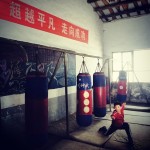Here is an essay from January of this year which I never finished, but addresses some of my thoughts on my own martial arts journey:
I took up Thai Boxing about a month ago and I am starting to finally understand how people become addicted to the martial arts. For me, this has always been a question I couldn’t really answer without cutting myself down.
See, when I studied kung fu, I did it for weeks at a time, with months and years in between. There were times, like those three weeks out in Hanyuan working on a story, when I felt the passion of what I thought at the time could be an addiction, something that could become the dedication I had seen, heard about, longed for within myself. But it passed, and I returned to my old life. Dreaming of being a martial artist in the late morning and doing a lot more reading and writing than kicking and stretching.
There were a few incidents that threw my weakness and my lack of dedication to the martial arts back into my face:
There was the time I was out with Tenzin and Tian Hua in Tian Hua’s hometown of Pengzhou. For me, the story of Tian Hua and his town was paramount: the slow decay of Tian Hua’s former school, the dusty bored streets of his town, his obvious undimmed passion for kung fu and fighting and the art that made him a man. The tragedy of Tan Hua was more important to me than whatever it was he wanted me to display, in order to prove myself a member of the club. Something about my demeanor, about the way I carried myself, the questions I asked, the things that seemed important to me … something abut how I stacked up to Tenzin, a mountainous physical presence, made Tian Hua lash out late that night. Drunk off baijiu, he kicked me a bunch of times, screaming out at me, “You’re no kung fu man!” which in Chinese, 你不是功夫人!feels so much stronger. There is a categorization that takes place and I was on the wrong side. I never spoke to Tian Hua again after that night. Tenz would remind me of that night every so often , perhaps to rub it in. Shifu laughed when I told him what had happened, “Tian Hua is a hothead, always has been. Forget about it.”
Another time, I sat at the table with Shifu, Shiye and Lao Wu and we talked about Lao Wu’s garlic business and how I might be able to help. Talk drifted to martial arts. Lao Wu was a boxer and clearly remembered how to fight and carry himself like a fighter. When Shifu mentioned I studied kung fu, Lao Wu looked at me skeptically. “But he can’t possibly learn kungfu,” he said. Again, the Chinese version seems so much more powerful: 他没有悟性 ie he is unable to learn. Shifu said, “I will determine whether he can or cannot learn.” I never saw or spoke to Lao Wu again either, but it stayed with me.
Shifu always said I was tripping when I brought up the fact that I didn’t belong. He got a little gruff and said, “You’re my student. You belong.” Other times he would say, “Your pen is your kung fu.”
A few moments that stuck with me shouldn’t define ten years of interaction with Chinese martial arts, but they did. I remembered those moments most of all, and forgot any others that may have presented a different relationship. I didn’t train enough, wasn’t really into it, and basically wanted to cut out the hard body stuff and horse stance suffering and get right to the “enlightenment” part of kungfu. I wrote a little bit about this idea very recently for Fightland in an essay called, “Why Kungfu Masters Refuse to Teach.” In the essay I try to pick apart the traditionalist stand-point a bit, and show how their way of thinking helps lead to a perceived decline in the traditional Chinese martial arts. For me I was always so much more interested in the lore of it all, despite my fantasies of being the baddest man in the world.
I think my fantasies may have leaked out into the space around me, been picked up by real kungfu men, and been scoffed at as the mewling of the softcore scholar. I’m not too sure anymore, but the feeling of not belonging remained.
*****
Then I joined the Cellar gym and began training Muay Thai, a bit of kickboxing, some boxing. The difference in how I approach training at the cellar versus training kungfu with my master in China is dramatic. I go almost every day to train at least one, usually two hours. I always come home feeling like I’ve made progress. I can see my progress actually, each time I throw a jab-cross, switch kick into Thai pads, or go a little bit longer with the jump rope before faltering.
I rarely had this feeling when I was training kungfu in China. We never hit pads, rarely did partner work, and I don’t remember ever putting on gloves for any reason. In the kungfu world, it was me versus my shadow, versus the wood, versus the world-blotting sand bag hanging by a thread over the very center of the earth. I remember pain, a lot of awkward movements, and failure.
At Shifu’s, there were maybe a handful of students, all of very different strengths, doing the same exercise each and every time. We did the forms, stood in the stances, hit the iron circle and perhaps the wooden dummy. It was hot and sweaty and painful. I rarely saw any progress … the bruises would fade and get covered by other bruises. My kicks might improve slightly, maybe I was able to touch my toes. I do remember coming back from a few weeks at Shifu’s place and a friend told me, “Dude, you look fantastic.” And I took the compliment and forgot about training.
When I was in my 20s in China, with the opportunity to train with Shifu, I chose weed, wine, and women instead. So when I did train, it was never with devotion. I didn’t take the training home with me and repeat or try and get better. So whenever I went to Shifu’s, it felt like I was starting all over again, year after year.
There are other factors here at play besides the training methods, I am sure of that as well. I am older now, and hopefully bit wiser. Age has shown me not only the encroaching limits of my physical form, but also the critical need for me to get healthy and in shape before it’s too late. These days, I dream constantly about hitting pads and kicks. I am anxious about my training and a day or two without a trip to the gym and I feel compelled to set aside everything in order to get my ass back in there.
At the Cellar we have pads and gloves, shin guards and systematic training. Work the punches then the kicks, then go to clinching. Hit the bag, hit each other—lightly—back to the pads. I feel like this regimen will create a new me every 3-6 months. I am starting to get addicted. I am starting to feel that pull that all of the martial artists seem to talk about.
I can’t help wondering if Shifu had had pads to hit and had run his training sessions a bit more like the cellar does, perhaps I would have been more willing to train. Maybe I wouldn’t have to take this final lunge into the martial world this late in life and hope that I am not too late. The clear answer is, No. Back then I was too stupid to know what I had with Shifu, and today I am less stupid.
Regardless, I have found a place to train and a discipline I am falling in love with. So looking into my past and trying to rationalize not training when I could have is just a mental exercise. It doesn’t really matter. Not anymore.



